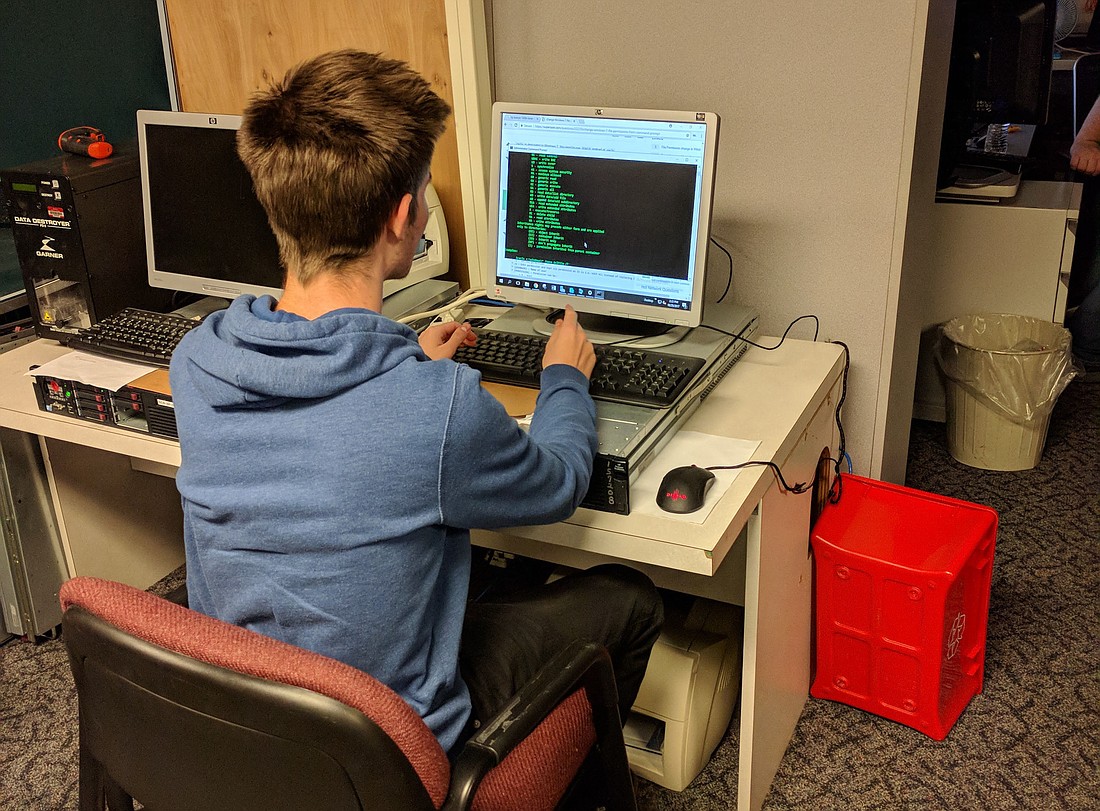- April 23, 2024
-
-
Loading

Loading

When your hobbies include trying to break into computer systems, things don’t always go your way.
In fact, it can get you in a lot of trouble, as several Sarasota County students have learned since the beginning of last year.
But thanks to an internship program at Sarasota County Schools, seven students with a proclivity for hacking are able to learn how to put their knowledge to good use in a structured environment, under the supervision of the district’s IT staff.
Although each student in the program was invited to join only after a digital indiscretion, Director of Information Technology Joe Binswanger hopes to get the program to a point where administrators can pick students to join before their hacking experiments get them in trouble.
For example, Angela Homoky’s son, Noah, a senior at Venice High School, was sitting in a computer class but had already finished his assignment. To pass time and try out information he had been studying on his own, he wanted to see if he could get into the school system. As it turns out, he could.
“You kind of opened a bank vault and looked in, but you didn’t do anything really — you wrote your name on the wall and you shut the door,” Angela Homoky said.
“They’ve been allowed to come to Disney World now. But they know if they goof up, they’re kicked out of Disney World.”
Once he got in, Noah Homoky changed the background color of something and went to the IT department at his school to let them know he was able to get into the system.
The next period, the principal came for him. He knew he was in trouble. Hacking into a system like he did can result in suspension, expulsion and even felony charges. But with the district’s internship program in place, that didn’t happen this time.
Binswanger said that in cases like Noah Homoky’s, it sometimes becomes clear through conversations there was no malicious intent — the student was curious more than anything else, and wanted to learn. That leaves school officials with a choice.
“We can work with the administration to punish them to the nth degree, or we can say ‘why don’t you learn more about what you’re trying to learn in a controlled environment, and then actually begin to put that curiosity to good use?’” Binswanger said.
Essentially, the district is intervening in these students’ educations to make sure they become “white hat hackers,” a term used to delineate the good guys from the bad guys. White hat hackers use their hacking knowledge for good. They could be cyber forensics or cybersecurity experts. They could help police solve crimes, or be hired by companies and organizations to identify vulnerabilities in their computer security systems.
Students in the program learn about virtualized servers and server infrastructure; they visited the district’s data center a few weeks ago; after Hurricane Irma, they help set computer labs back up in shelter schools; and occasionally they test out new classroom technologies to find vulnerabilities that other students may try to hack.
While that may not seem like everyone’s ideal after-school activity, Binswanger said the students in the program love it. Many have started getting better grades in their classes, he added.
“They have a genuine interest and passion for technology and programming and understanding how things work,” he said. “And for them, this presents an opportunity to delve into that world in a meaningful way with knowledgeable people that care about their education.”
As Angela Homoky puts it, the program catches students who may be on the precipice of doing something they may ultimately regret, and instead shows them another path with more positive outcomes.
And according to Binswanger, the wonders of the good side keep the students honest and focused in this “one strike and you’re out’’ situation.
“They’ve been allowed to come to Disney World now,” he said. “But they know if they goof up, they’re kicked out of Disney World.”